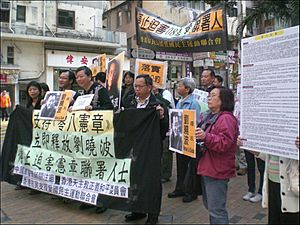Charter 08 facts for kids
Quick facts for kids Charter 08 |
|||||||||||
|---|---|---|---|---|---|---|---|---|---|---|---|
| Traditional Chinese | 零八憲章 | ||||||||||
| Simplified Chinese | 零八宪章 | ||||||||||
|
|||||||||||
Charter 08 is a special paper that was first signed by over 350 Chinese thinkers and people who work for human rights. It was made public on December 10, 2008. This date was important because it was the 60th birthday of the Universal Declaration of Human Rights. The name and style of Charter 08 were inspired by Charter 77, which was a similar paper from Czechoslovakia that spoke out against the Soviet government. Since it was first shared, more than 10,000 people both inside and outside China have signed Charter 08.
One of the main people who helped write Charter 08 was Liu Xiaobo. He later won the 2010 Nobel Peace Prize for his work.
What Did Charter 08 Ask For?
Many of the first people to sign Charter 08 were important citizens. They included lawyers, a Tibetan poet named Woeser, and Bao Tong, who used to be a high-ranking official in the Communist Party. These people took a risk by signing, as they could have been arrested or jailed.
The Charter asked for 19 important changes in China. It called for things like a fair and independent legal system, the freedom for people to form groups, and an end to one-party rule. The Charter said that many problems were building up in society and people were becoming unhappy. It stated that the current system was old-fashioned and had to change. The Charter also pointed out that China was the only major world power that still had a government system that limited people's rights so much. It said, "This situation must change! Political democratic reforms cannot be delayed any longer!"
Key Ideas in the Charter
Here are some of the specific changes that Charter 08 demanded:
- Changing the country's main law, the Constitution.
- Separating the powers of government into different branches.
- Making laws through a democratic process.
- Having a court system that is fair and independent.
- Allowing the public to check on government workers.
- Making sure everyone's human rights are protected.
- Letting people vote for their public officials.
- Ending the Hukou system, which controls where people can live.
- Giving people the freedom to form groups.
- Allowing people the freedom to gather peacefully.
- Protecting freedom of expression, so people can speak their minds.
- Ensuring freedom of religion.
- Teaching people about their rights and duties as citizens through civic education.
- Having free markets and protecting private property. This included selling off state-owned businesses and land.
- Making changes to how money is managed and how taxes are collected.
- Providing social security for people.
- Working to protect the environment.
- Creating a federated republic, where different regions have more power.
- Seeking truth and reconciliation for past events.
The Charter also explained why these changes were so important. It mentioned that 2008 was a special year, marking 100 years since China's first constitution and 60 years since the Universal Declaration of Human Rights. It said that after many difficult times, Chinese citizens were realizing that freedom, fairness, and human rights are important for everyone. They also understood that democracy and a republic are the best ways to run a modern country. The Charter argued that a country cannot truly become modern if it doesn't have these basic values and a democratic system. It asked a big question: Will China continue with its current system, or will it accept universal values and build a democratic political system?
See also
 In Spanish: Carta 08 para niños
In Spanish: Carta 08 para niños
 | Leon Lynch |
 | Milton P. Webster |
 | Ferdinand Smith |


